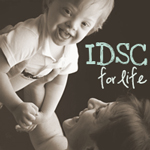The American Academy of Pediatrics (AAP) released new health care guidelines for practitioners. I read through the new guidelines, which you can view here, to see what all they included.
I thought I'd comment on a few parts of the guidelines.
The introduction to the guidelines is:
These guidelines are designed to assist the pediatrician in caring for the child in whom a diagnosis of Down syndrome has been confirmed by chromosome analysis. Although a pediatrician’s initial contact with the child is usually during infancy, occasionally the pregnant woman who has been given a prenatal diagnosis of Down syndrome will be referred for review of the condition and the genetic counseling provided. Therefore, this report offers guidance for this situation as well.Pretty much all of the language in the paper is written towards pediatricians & doctors. But, it is still good information to have on hand, to see what the doctors are supposed to be doing in their care for people with Down syndrome.
In the section about what the doctor should discuss with the family, upon finding out a diagnosis about Down syndrome, they write,
The prognosis and phenotypic manifestations, including the wide range of variability seen in infants and children with Down syndrome. Families benefit from hearing a fair and balanced perspective, including the many positive outcomes of children with Down syndrome andThis is something which is oh, so important and is commonly forgotten! I'm glad they included it here, I just hope that the doctors, pediatricians, counselors & OB-GYNs will actually listen to this piece of the article.
their effect on the family. (bold added)
Many parents are given the diagnosis in a blunt way and the future is portrayed to be dark & gloomy for their child with Down syndrome. That's what we got when my brother was diagnosed with DS. Sure, there are things that may take more time or need extra care, but it's not a bad thing. My brother is a huge blessing to our family and he definitely has not fulfilled the dark future we were told.
Here is another thing they mention in the first section when the diagnosis is first given,
Currently available treatments and interventions. This discussion needs to include the efficacy, potential complications and adverse effects, costs, and other burdens associated with treatments. Discuss early-intervention resources, parent support programs, and any appropriate future treatments. (bold added)I like the mention of "any appropriate future treatments" because that could include so many things! It would be nice if every doctor included the use of Targeted Nutritional Intervention, because it is an appropriate "treatment." Unfortunately most doctors don't mention the use of TNI.
Another quote from the first section in the article,
An important aspect of providing information about Down syndrome to families includes first congratulating parents on the birth of their infant.No need to comment very much on this one. I think it's obvious what is beneficial here. It's very good to see this article mention the positive aspect of things and congratulating the family on the birth of their baby. Every OB-GYN, Pediatrician and Counselor should have this part of the article in their office and routine.
....It is important that clinicians be cognizant of the realities and possibilities for healthy, productive lives of people with Down syndrome in society.
They only briefly mention the use of vitamins in the article,
Discuss treatments that are considered complementary and alternative. Parents need an opportunity to learn objectively which therapies are safe and which are potentially dangerous (eg, cell therapy that may transmit slow viruses and fatsoluble vitamins that can cause toxicity).I wish they would've mentioned the use of vitamins more and in a more positive light. They cited three articles, which you can see here, here and here. Those articles are all pretty general on the use of supplements. I wish they would've dug just a little deeper and cited articles which hint towards a positive use of nutritional intervention. There are a lot of studies which suggest nutritional intervention, and even intervention with certain drugs is very beneficial. This study is one such study. There are plenty more which can be looked. If you're curious about seeing more, they are all footnoted here at the footnotes, 1-38, 100-101, 254, 256, 259, 449, & 451.
Several articles and Internet sites evaluate the legitimacy of claims that are made.
While there are some positive things in this new health care guidelines, there are still things which are sorely lacking. I'm not really surprised at it, because it is the norm. I just wish it wasn't the norm. I wish nutritional intervention were embraced as a good thing by all those involved with Down syndrome. That's a lot to hope for I guess, when the largest research goal, it seems, is how to prenatally diagnosis babies with Down syndrome.

Tweet























0 comments:
Post a Comment